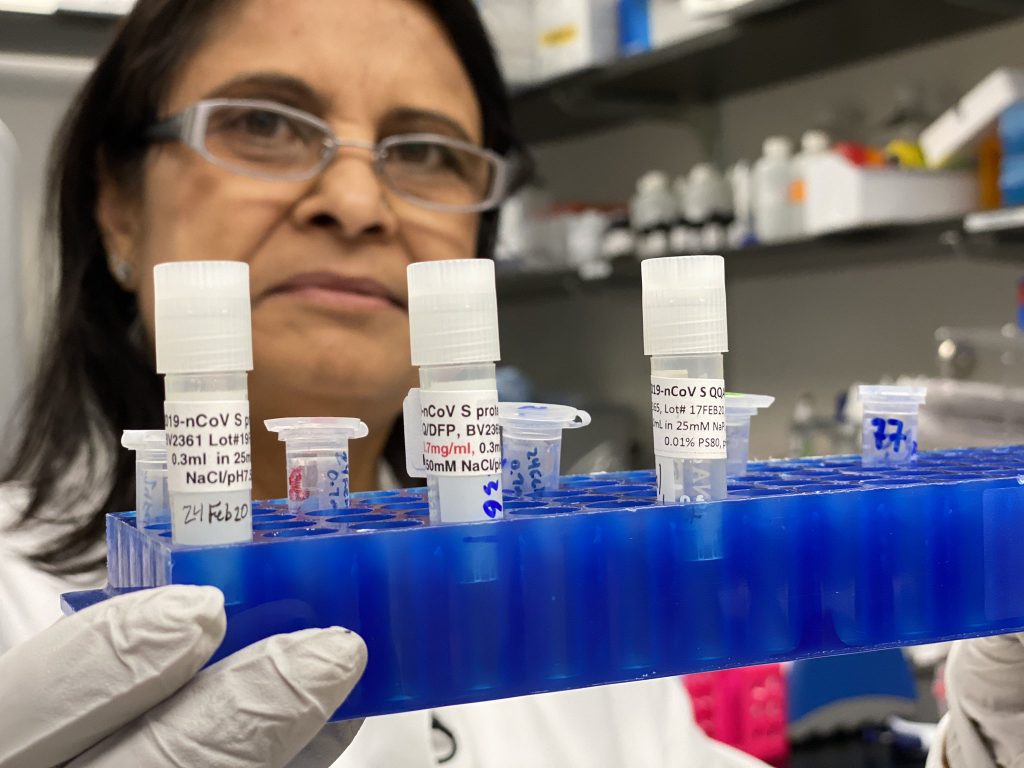
The current pandemic that’s wrapped itself around the world is COVID-19, a highly contagious infectious disease that originated in Wuhan, China and has infected more than 600,000 people, having claimed more than 100,000 lives in the U.S. alone. This disease has spread worldwide, having killed more than 27,000 around the world in countries like China, Italy and Iran.
To prevent further spreading of the disease, experts are working around the clock to develop a vaccine, include an all-female team from the Novavax Lab in Gaithersburg, Maryland led by Dr. Nita Patel.
Read Related: COVID-19: 6 Ways to Stay Safe and Sane
Dr. Patel serves as the Director for Vaccine Development and Antibody Discovery at Novavax, a clinical-stage biotechnology company that is committed to delivering innovative products to prevent infectious diseases. At the company since 2015, Dr. Patel worked as a Scientist and Research Manager at AstraZeneca for 25 years. She moved to the United States with her husband 32 years ago from Gujarat, India.
“You know, I’m a woman and that’s encouraging to see that somebody, women, brought the vaccine to the market.”
Her strong interest in science began during her childhood. When she was only five-years-old, her father was diagnosed with tuberculosis and was disabled by the time he was in his mid-thirties. This fueled Dr. Patel’s desire to find a cure for the disease, and she began her career as a scientist in the United States working on the TB vaccine project. Her father was a strong believer in higher education and did everything he could to support her education and encourage her dreams.
Females at the Forefront —
Meet the all #women team of #scientists looking to create the first viable #vaccine for #COVID19.
I got to see the @NovavaxInc lab in Gaithersburg, MD where they have three vaccine options they’re currently testing!@ABC7News #coronavirus #science pic.twitter.com/vtQpNICtjC— Victoria Sanchez (@VictoriaSanchez) February 28, 2020
Since the outbreak of COVID-19, Dr. Patel and her team of women scientists have labored trying to develop a vaccine as quickly and effectively as possible. Her lab uses state-of-the-art Recombinant Nanoparticle Technology to make vaccines, using insect cells as protein to make machinery.
Novavax’s President of Research and Development, Dr. Gregory Mark Glenn, said that work on the vaccine began on January 10th and that they hope to finalize the testing and production of the vaccine in the next 18 months.
“We learn from each other, and science is learning from experiences.”
Dr. Patel and her team have already developed three possible vaccines. Currently, the vaccine is in the second phase of development, testing on animal subjects. If all goes according to plan, the vaccine should be ready for human testing in the next three months.
Read Related: Make Quarantine Fun with Activities for Everyone in Your Home
Dr. Patel and her COVID-19 vaccine team are aware of how they’re inspiring young girls interested in science. A study from the Unesco Institute for Statistics has indicated that less than thirty percent of the world’s researchers are women. Despite the increasing demand for gender equality in employment, women’s role in science and policymaking is limited. However, should Dr. Patel’s team successfully develop the first COVID-19 vaccine, more women might be encouraged to enter the field of science themselves.
Dr. Patel’s message to women and girls everywhere is, “Science is fun, challenging, and rewarding. Remember, you are contributing towards better medicine which can make a difference in people’s lives…pursue your dreams!”
She hopes if the vaccine is successful, it will encourage more women to become scientists, especially more women of color, in order to increase diversity in the field.




